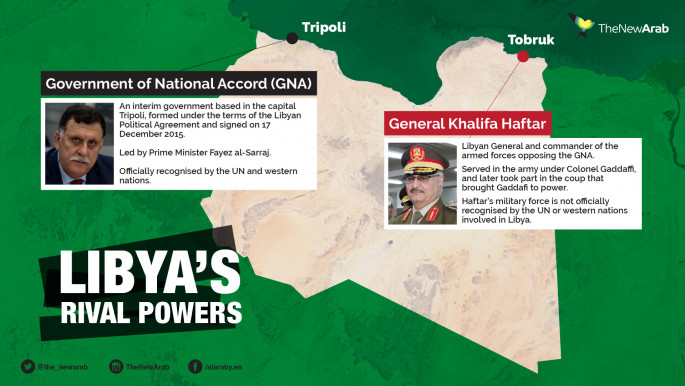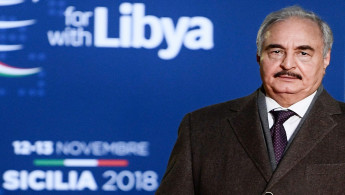Libyan warlord Haftar declares 'jihad' over possible Turkish intervention
The beleaguered Tripoli government, headed by Prime Minister Fayez al-Sarraj, has been under sustained attack since April by Haftar, a strongman who heads a rival administration in the country's east backed by Turkey's regional rivals - Saudi Arabia, Egypt and the United Arab Emirates.
Turkey's parliament on Thursday approved the deployment of troops to Libya after it received a request for military support from Sarraj's UN-backed Government of National Accord (GNA).
"We accept the challenge and declare jihad and a call to arms," Haftar said in a televised address on Friday.
He urged "all Libyans" to bear arms, "men and women, soldiers and civilians, to defend our land and our honour".
His fight was no longer a question of liberating Tripoli from "militias", he said, but of "facing a coloniser", accusing Ankara of wanting to "regain control of Libya", a former province of the Ottoman Empire.
The prospect of a Turkish military intervention in Syria has provoked international condemnation.
The Arab League has warned against "interference", which it said could "contribute to facilitating the arrival of foreign extremists in Libya".
 |
| [Click to enlarge] |
African Union chief Moussa Faki Mahamet on Saturday warned against the increased risk of "confrontation" bettween foreign powers in Libya "whose motives have nothing to do with the fundamental interests of the Libyan people and their aspirations for freedom, peace, democracy and development".
Cairo has strongly condemned the Turkish vote, saying it amounted to a "flagrant violation of international law and Security Council resolutions on Libya", while Israel, Cyprus and Greece denounced a "dangerous threat to regional stability".
Haftar has reportedly requested military support from Egypt's President Abdel Fattah al-Sisi.
While the Tobruk government based in the country's east and associated with Haftar's forces condemned the possible deployment of Turkish troops as "high treason", the LNA has accepted military support from foreign forces in the past.
Read more: 'No end in sight': Why Libya's proxy war might be about to flare-up
Both Jordan and the UAE have violated a United Nations arms embargo to support Haftar, UN experts said late last year. Russia has also been accused of sending private mercenaries to fight alongside Haftar's forces, although this has been denied by Moscow.
Turkey is also accused of violating the same UN arms embargo in support of Sarraj's government.
Increasing tensions over foreign intervention in Libya began in November, when Ankara and Tripoli inked both military and maritime cooperation deals.
The equally controversial maritime jurisdiction agreement, ratified by Turkey's parliament in December, gives Turkey rights to large swathes of the Mediterranean where gas reserves have recently been discovered.
The agreement drew harsh international criticism, particularly from Athens, which says it ignores its own claims to the area.
The European Union has previously threatened Turkey with sanctions over gas exploration off the coast of Cyprus.
Follow us on Twitter and Instagram to stay connected





 Follow the Middle East's top stories in English at The New Arab on Google News
Follow the Middle East's top stories in English at The New Arab on Google News
![The UAE is widely suspected of arming the RSF militia [Getty]](/sites/default/files/styles/image_330x185/public/2024-11/GettyImages-472529908.jpg?h=69f2b9d0&itok=Yauw3YTG)
![Netanyahu furiously denounced the ICC [Getty]](/sites/default/files/styles/image_330x185/public/2024-11/GettyImages-2169352575.jpg?h=199d8c1f&itok=-vRiruf5)
![Both Hamas and the Palestinian Authority welcomed the ICC arrest warrants [Getty]](/sites/default/files/styles/image_330x185/public/2024-11/GettyImages-2178351173.jpg?h=199d8c1f&itok=TV858iVg)